after experiencing trauma, even safe and secure relationships we form can still feel unsafe or threatening to us.
we may crave closeness and love, yet find ourself pulling away out of fear of being hurt again.
this is our nervous system and mind doing its best to protect us at any cost.
but healing is possible with time, effort, gentleness and compassion.
we can learn to feel safe again and teach ourselves that love doesn’t have to mean danger and fear.
in this article we will gently explore ways to rebuild trust and safety, to form relationships where our hearts can finally rest.
why we need to feel safety in relationships
relearning safety in relationships whilst navigating our way through the complexities of trauma is a difficult path, but it is a path we are fully capable of walking.
everything begins with belief. the mind is ever so powerful.
when your mindset begins to says, ‘i deserve to feel safe’, ‘i am worthy of being in a secure relationship’, your healing has already begun.
you must believe.
feeling safe is not just important for us, it is essential.
safety is ultimately the foundation everything is built upon;
our healing, growth, connection, wellbeing and development, both individually and in relationships with others.
based on Maslow’s Hierarchy of Needs, developed by psychologist Abraham Maslow (1943), safety it is a fundamental human need.
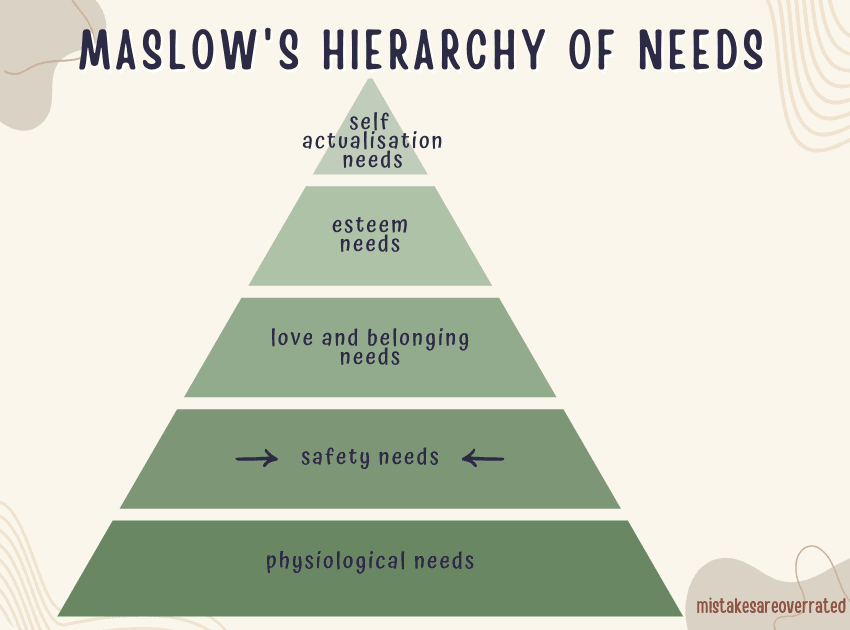
we don’t want to feel rushed, but we also don’t want to feel like we’re withdrawing when things get vulnerable.
when we have unresolved trauma, it is very common for our brains to react to the present time as if we are still in the past.
instead of being present, our brain can emotional and neurological respond as if we are in the past with our trauma (this can happen consciously or unconsciously).
this is because, when we are triggered, the past emotional imprint (our emotional response) can be replayed.
our brain can shift into our fight, flight, freeze response (trauma response), as if our original traumatic event/s are happening all over again.
we can enter this response even if we are physically safe in the present moment.
one of the greatest gifts we humans can learn and do, is to be present.
it is very hard for us to live in reality, with the present world around us, when we are stuck in a memory of the past due to unresolved trauma.
learning to heal and slowly resolve these traumatic memories can help us profoundly when learning to feeling safe in new relationships.
keeping the past in the past
we need to remember that this person is a completely different human to the person or people who once hurt us.
they are nothing like the past people we have met and been with, so why do we have these internal thoughts or beliefs that they will do a particular thing?
say a certain thing?
or act a specific way?
i too am guilty of this. i used my unresolved trauma as a way to protect myself from potential hurt with new people i met and dated.
it was almost like a “oh well, i already saw it coming, so it doesn’t hurt as bad”.
when in reality, why did we even have that in the first place?
we need the chance to express what we have been holding within – the things we never had the opportunity to share.
the reason we’re here today is because we all ideally want to end up with the same end goal,
healing our trauma and being able to feel loved and safe again.
but, we need to realise that we all take very different routes, paths and steps to be able to reach this desired end goal.
we need to remember that we are all unique human beings, we aren’t a one plan works for everyone type of species.
we must heal on our own terms, in our own time, in our own way, and not fall into the trap of comparing ourself to others.
ways to feel safe in a relationship
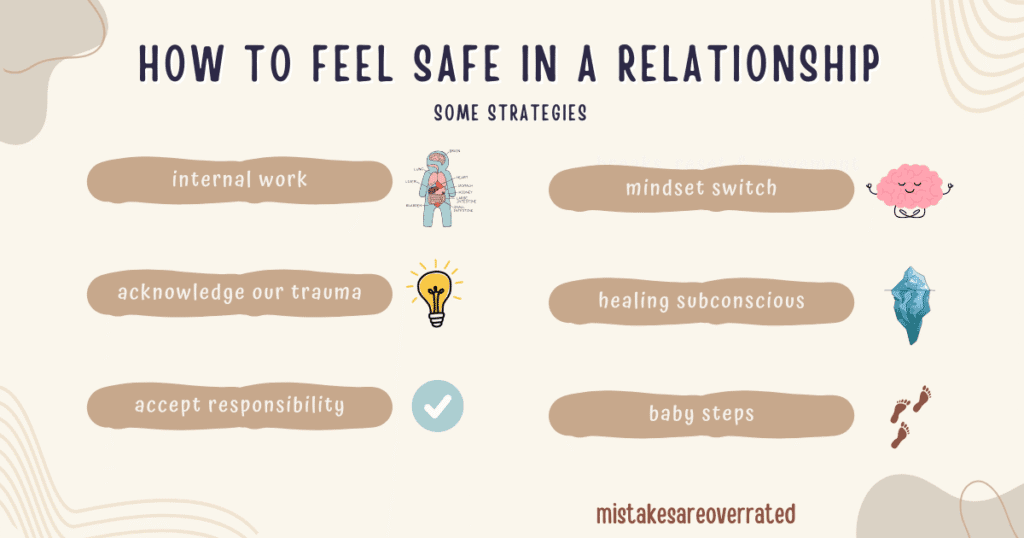
internal work
we need to prioritise our safety and trust within ourself to begin with.
i cannot express the importance of firstly rebuilding our self trust – it is a must.
trauma often makes us doubt our own instincts, opinions and perspectives in life, both internally and externally.
i suffered from this immensely, i felt as though i couldn’t trust my own choices or behaviours after my traumatic experience.
this is when intentionally tuning in to our inner voice and honouring what it is telling us play an important role.
to feel safe again in a relationship, we cannot forget about the deep internal work.
this work is a continual journey, a process that doesn’t have an end point.
but this work we do for ourselves to grow and heal is one of the best decisions we can make in life, well, in my opinion, it is anyway.
get a blank piece of paper and ask yourself: what do i need to feel safe right now?
acknowledge our trauma
we do not want to minimise, push away or rush past what has happened to us.
recognising the impact our trauma has had on us and our life, is a good first step toward healing.
if you are wanting to acknowledge your trauma, this is how i came to recognise mine after years of denial and not even knowing the full extent of it;
please remember this is what i found helped me in my personal experience (i did alotttt of trial and error until i found what worked).
to begin with i made it a practise to remove all judgements i held about myself, people, beliefs, emotions, (pretty much everything).
i then created a safe space, away from all distractions, (mine was the beach), where i could engage in mindfulness.
my mindfulness included going for a slow coastal walk where i was paying attention to the present moment (my thoughts, surroundings, breathing, emotions, sensations, ect), before sitting on the beach with my journal.
i then wrote down questions i had, thoughts i held, emotions i felt, ideas that came up, express gratitude, just anything i felt in that present moment and the time leading up to it.
one of my journal prompts that helped me immensely with this area of wanting to feel safe in relationships again was this;
what are beliefs i hold?
then with 3 different coloured highlighters i re-read my beliefs written down and highlighted each belief with this key.
purple highlighter – beliefs i actually believe in and value.
green highlighter – beliefs that i somewhat hold, but they were created by external opinions (parents, friends, society, ect).
blue highlighter – beliefs i don’t believe in or value but they’re within me or i feel i need to believe in them.
accept responsibility to be held accountable
we have a deep, deep, deeeep desire to attract healthy relationships where we feel safe and trust our partner,
i mean, you’re here right now reading this article so you obviously want to find love that feels safe (romantic, platonic or familial love).
it took me a while to accept this sentence i am about to say to you because i was in denial, (and maybe a victim mindset), but i need you to know.
most of our life is an outward reflection of who we are or what we think within (to some exception).
with this being said, we need to reflect on the areas we can improve on.
how can we take responsibility? what does our ideal self look like? how can we hold ourselves accountable to change?
example: my parents split up and got back together at least 15 times in my childhood, so i developed a deep internal belief (also shaped by the words i absorbed growing up), that relationships don’t last, relationships are about fighting, relationships hold you back.
i only figured these deeply deeply seeded limiting self beliefs due to deep, hard, internal work and reflection.
i accepted that i am responsible, as no one else has control over my thoughts – yes outside opinions and voices shaped my beliefs, but now i am an adult so i can unlearn and learn new beliefs.
i held myself accountable by seeing real life examples of people who have been together for 40+ years.
i taught myself that relationships can last, relationships aren’t fighting all the time, relationships can help you grow and strive to be the best version of yourself.
mindset switch
we need to remove all judgements, opinions and beliefs we have about relationships.
relationships we have had in the past, relationships we had growing up, or just general beliefs we have.
what we believe deep down about relationships influence our perceptions, choices and behaviours.
releasing these deeply ingrained, limiting self beliefs allows us to open opportunities to form connections that are healthier and more secure.
we need to switch our mindset to heal any narrative and beliefs we have based on our past experiences, (this requires time, effort and persistence).
healing all subconscious limiting beliefs
this comes naturally within time by switching our mindset, if we truly believe what we are thinking deep deep down.
our subconscious mind is separate to our conscious thinking mind, however, it is ever so powerful.
the thoughts and words we repeat about ourselves, others, and the world around us eventually embed themselves deep into our subconscious.
this is why it is so important to begin to heal our mindset before we begin looking for a partner.
remove judgement. self judgements, internalised judgements and judgements towards others.
we need to learn to pay attention to our intuition – listen to those gut feelings, intuitive thoughts and “guide” we feel.
baby steps
from my experience, i recommend taking baby steps, as they progress over time.
baby steps enable you to not feel as overwhelmed and alone.
we do not want to pressure ourselves to trust quickly. trust is earned, not given.
a good way i did this was watching actions over time, as i found consistency builds safety.
slowing the pace gives us space to notice how someones words and actions align.
giving ourself permission to share our vulnerabilities in layers and process our feelings at our own pace is such a powerful aspect.
this is your journey. your story. your life. listen to yourself and take the time you need.
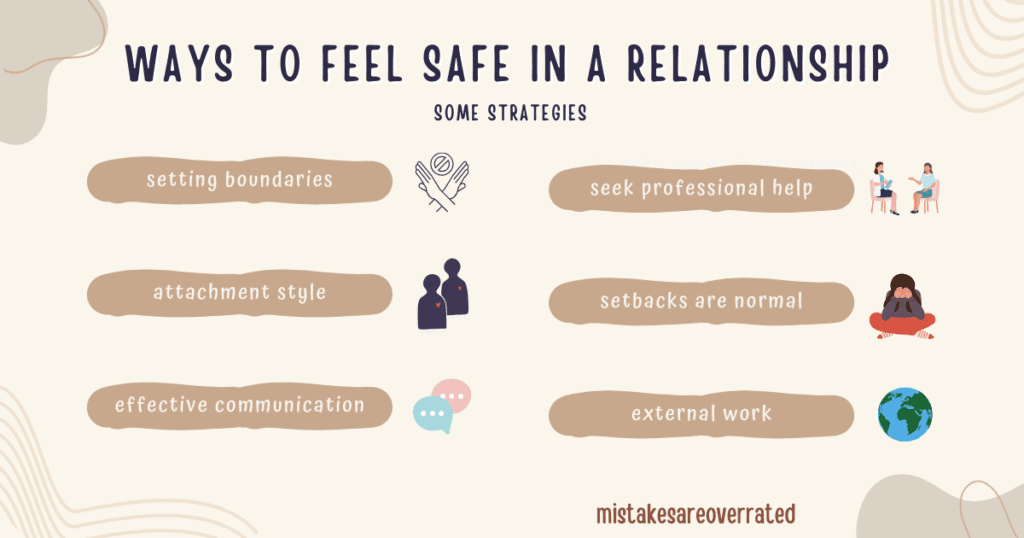
setting boundaries right from the get go
we need to establish what our boundaries are and not be afraid to protect them.
it is important for us to clearly express our boundaries to others, as the right people will respect them.
a boundary is a way of protecting our energy, time and peace, and is a form of self care.
when we communicate our needs early, we give our relationship a healthy framework to grow within.
for strategies and exercises to learn what your boundaries are, i have an in-depth article on how to set healthy boundaries here.
relearning and practising our attachment style
unfortunately trauma can sometimes disrupt our attachment style, but we can gently explore secure attachment traits, and implement them into our life.
unlearning the protective patterns we may have developed to survive after trauma will require time, but i believe that you can do it.
attachment styles we may have are avoidant, anxious, or disorganised.
replacing these patterns with healthier ways of connecting begins with noticing how we respond to closeness, conflict, and vulnerability.
then we can intentionally practice new responses – ones that build trust, connection and safety.
these small, consistent changes can help rewire our nervous system, making us feel more secure in relationships over time.
examples: communicating your needs openly, active listening, regularly checking in with your body, boundary setting, emotional regulation, self compassion, ect.
effective communication
this means being able to express how you’re feeling and your needs openly, while listening to what the other person has to say.
active listening is a key component in this, as the other person needs to be able to express their thoughts and feelings too.
it is important that both people feel heard and valued in a relationship.
this brings clarity, understanding and ultimately trust, helping us rebuild the sense of safety that trauma may have taken from us.
seek professional help
seeking professional help can provide us with valuable guidance and tools that are specifically tailored to your needs, healing and goals.
i highly advise you to seek professional help from a trained mental health or health professional
– a psychologist, psychiatrist, therapist or any trained professional of that sorts.
all of the information and strategies i am providing you with today is purely from personal experience and it should never constitute professional advice and should not be relied upon as such.

setbacks are completely normal
please know that healing isn’t linear, setbacks are a normal part of healing.
feeling unsafe sometimes does not mean we aren’t making progress, as feeling safe in relationships after trauma takes time, patience, and gentle, consistent practice.
internal work and external work
i strongly believe building trust has to begin within before we can expand to others.
internal work
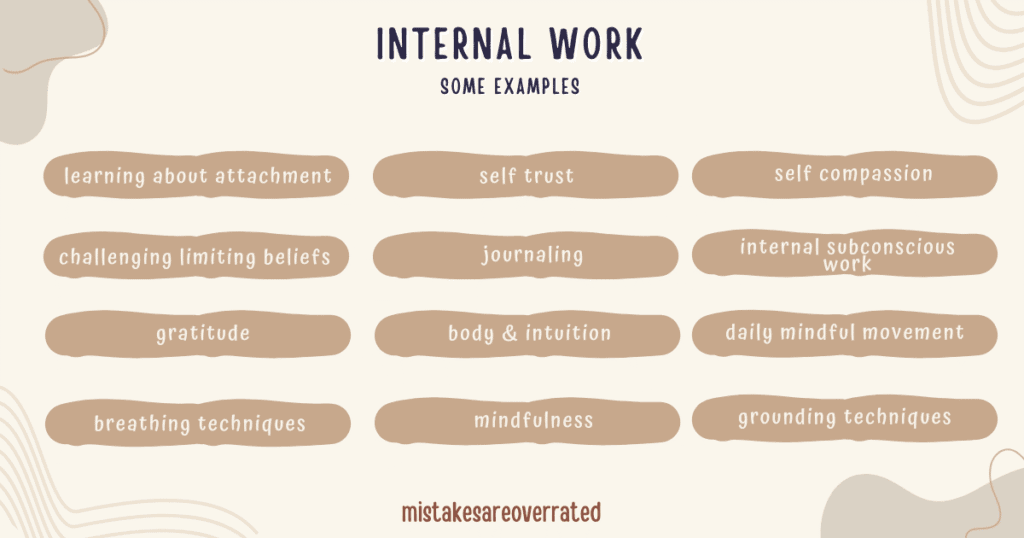
within ourself.
this requires us to dive deep within to navigate our way through our journey.
- learning about attachment styles and practicing attachment behaviours
- challenging our limiting beliefs
- gratitude
- breathing techniques
- building self trust (this can look like making and keeping small promises to ourself)
- journaling
- listening to our body and intuition
- mindfulness
- self compassion
- internal subconscious work
- daily mindful movement
- grounding techniques
external work
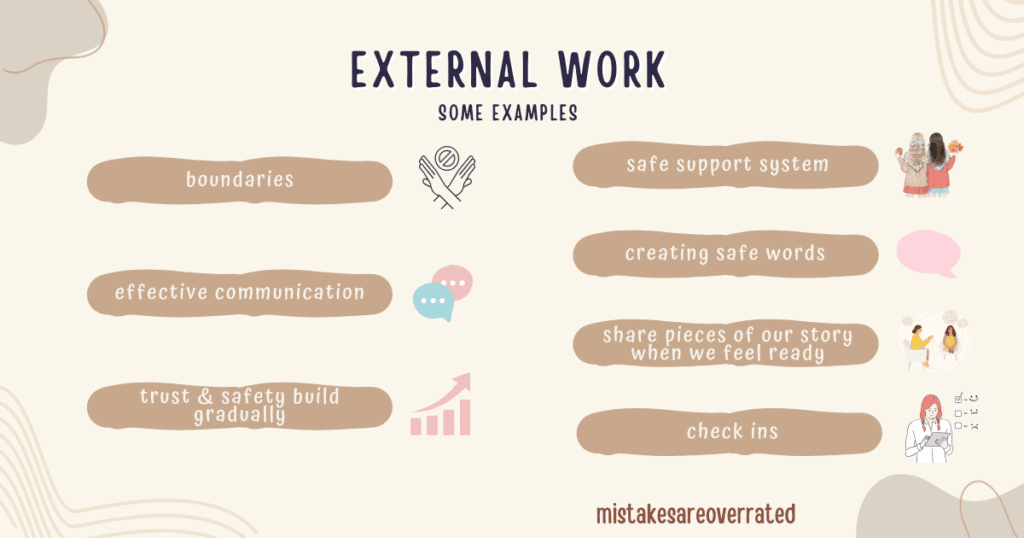
with others.
these are tools we have that can help us navigate through our journey.
- setting and maintaining our boundaries
- effective communication
- allowing trust and safety to build gradually
- having a safe support system
- creating safe words
- share pieces of our story when we feel ready
- having check ins with each other
signs you are struggling to feel safe in relationships
it is important for us to identify and acknowledge what signs and symptoms our body holds, to help us heal.
list the subtle or obvious signs you feel within that may correlate to safety.
some signs and symptoms may include but aren’t limited to;
– shutting down or entering your trauma response during conflict
– not feeling comfortable enough to share your emotions or how you feel
– feeling responsible for the other persons emotions or reactions
– tendency to people please
– avoiding intimacy
– losing your self in the relationship
– needing constant reassurance
– hyperaware of the other persons actions or mood
– feeling constantly on edge
– avoiding closeness or withdrawing when things start to feel intimate
– constantly over analysing texts, words, or body language
– struggle to trust the persons intentions
– have difficulty setting or maintaining boundaries due to fear of rejection or them leaving
– reliving memories/triggers of past hurt or trauma
don’t give trauma the power to control you, you deserve to live the life you choose. take control of your trauma.
-life advice from one survivor to another
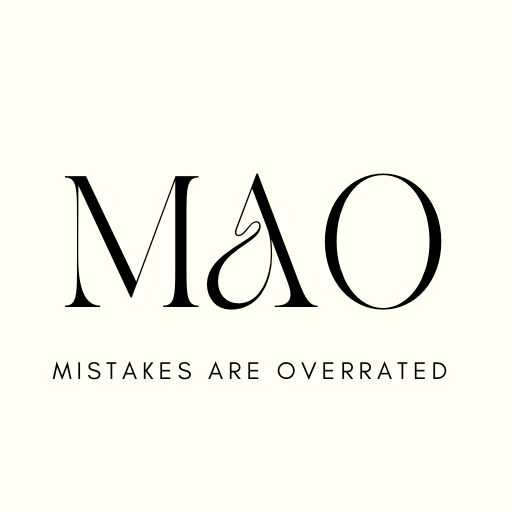
Leave a Reply